
- Starring
- Yoo Gong, Yu-mi Jung, Dong-seok Ma
- Writer
- Sang-ho Yeon
- Director
- Sang-ho Yeon
- Rating
- 14A (Canada), TV-MA (United States)
- Running Time
- 118 minutes
Overall Score
Rating Summary
When it comes to the pantheon of zombie films, the South Korean film, Train to Busan, is widely considered almost always at or near the top by critics and audiences alike and now after having watched it, it’s easy to see why. The film features the best of what this subgenre has to offer, delivering blockbuster-like thrills and excitement out of what amounted to an indie budget. While zombie films (and all the tropes and contrivances that come with it) were never going to be for everyone and that’s okay, this relentless and nuanced tale elevates the subgenre sets it apart and the roller coaster of tension and emotion rarely took a break. The production value was quite remarkable considering the film’s low budget, from the set design, to the cinematography, to the score, and the special effects which were admittedly spotty at times but that only added to its overall charm.
The story of Train to Busan is pretty self-explanatory and involves a train travelling from Seoul to Busan but this just wasn’t any train ride as a mysterious virus breaks out, turning people into zombie-like creatures (don’t expect any kind of explanation as this is pretty much par for the course for these types of films). While the film foreshadows this with an eerie opening, the full impact of it isn’t truly felt until the titular train leaves the station. Though the confines of the train may look safe, that same chaos inevitably caught up with them rather quickly, leaving a considerable body count of nameless passengers in its wake. Unsurprisingly, those very same confines coupled with the unknown only heightened the sense of tension as the passengers were essentially trapped with the zombies all while the world outside fell apart as it succumb to the zombie plague. The rules revolving said zombies may be a contentious point for some (they do some crazy and sometimes contrived things in service of the plot), however, this was easy to overlook.
Train to Busan keeps up with many groups of passengers on the train, focusing mostly on a divorced, workaholic father named Seok-woo (Gong) and his young daughter Soo-an (a not annoying Su-an Kim) whose relationship was a complicated one among others. What better than a crisis to bring them together? As the train kept rolling, suffice it to say that the situation became increasingly dire as the infection spread (surprisingly quickly for that matter). From there, it was all about survival and seeing these strangers come together was certainly powerful to watch and their various mini-subplots intersected for the most part in a satisfying way. However this came second to the zombie outbreak and for that, the film did not disappoint in that it will more than likely keep viewers on the edge of their seats and feeling a roller coaster of emotions (including some surprising ones) all the way until the end. While the film’s many impressive action set pieces could get hectic at times, they also won’t always be for the faint of heart (which is usually par for the course).
As mentioned, Train to Busan may be impressive narratively but it is also impressive technically thanks to its ingenious use of its low budget. The cinematography and camerawork not only does an adept job at keeping up with the action, it also makes the film and all the carnage beautiful to look at. The makeup, prosthetic work, costumes, and choreography used to bring the zombies to life is some of the best in recent memory. The set design, the sound design, and the theatrical score all help to set the mood and accentuate the mood nicely. Where the film does falter slightly and is also where the low budget is most apparent was the special effects which is easy to overlook. Though the CGI is admittedly spotty at times, this is just nitpicking at this point. Meanwhile, what ties the film together was its solid performances across the board. First and foremost, Gong’s charisma and screen presence shines through his nuanced performance as Seok-woo, showing vulnerability at times and also taking charge of the situation. Jung was solid as a pregnant woman named Seong-kyeong while Ma is memorable as Seong-kyeong’s alpha male husband Sang-hwa.
In the end, you owe it to yourselves to watch Train to Busan.
still courtesy of Well Go USA
If you liked this, please read our other reviews here and don’t forget to follow us on Twitter or Instagram or like us on Facebook. Also subscribe to our YouTube channel.

The EIC of the coincidentally-named keithlovesmovies.com. A Canadian who prefers to get out of the cold and into the warmth of a movie theatre.
